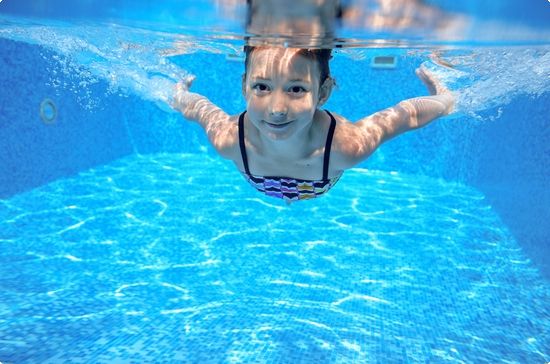Spending time swimming in lakes and pools can lead your child to experience some minor conditions, such as red eyes and swimmer’s ear. While these conditions don’t outweigh the fun and health benefits of swimming, you still want your kids to have the best experience they can every time they hit the water, and that goal includes avoiding pesky ailments. Keep reading to learn what you can do to prevent and treat some common conditions caused by swimming.

Rashes and Dry Skin
One common mistake swimmers make is not drying off properly after leaving the water, so once your child is out of the pool, have him rinse off with cool or warm water. Never use hot water because that can make dry skin worse. Wrap your child up in his towel and pat his skin dry all over, even if it’s hot outside; allowing the air to hit water droplets on the skin is what can make skin dry. Finish off with a hydrating lotion that is free of alcohol.
The Dreaded Swimmer’s Ear
Itchiness and pain in the ear associated with water—also known as swimmer’s ear—can be brought on by many factors, such as the higher bacteria counts in non-chlorinated bodies of water like rivers and lakes. One way to prevent this condition is to ensure your child’s ears are thoroughly dried after they get out of the water. Don’t use cotton swabs; instead, have your child tilt their head to the side and gently tug at their earlobe, and then do the same for the other side. If you have concerns, speak to your child’s doctor about using ear plugs or other precautions during swimming lessons in central Phoenix AZ.
Weak or Brittle Hair
A lot of time in the water can strip hair of its natural oils, resulting in dry and brittle hair. Having your child wear a swim cap will protect his or her hair, but if that doesn’t work or is not a feasible option, you can help restore hair by using conditioning treatments. Always have your child rinse his or her hair when he or she leaves the water, and then use a regular or leave-in conditioner.
Irritated, Red Eyes
Chlorine has long been fingered as the culprit for red eyes after leaving a pool, but it may actually be a combination of pool chemicals and whatever else is in the water that causes it. To help prevent red eyes, have your child wear goggles. If he or she still ends up with red eyes, you can flush them with fresh water or a saline rinse. Smaller children who may balk at eye drops can open their eyes in a sink with cool water or have shower water run down their faces instead.










Comments are closed.